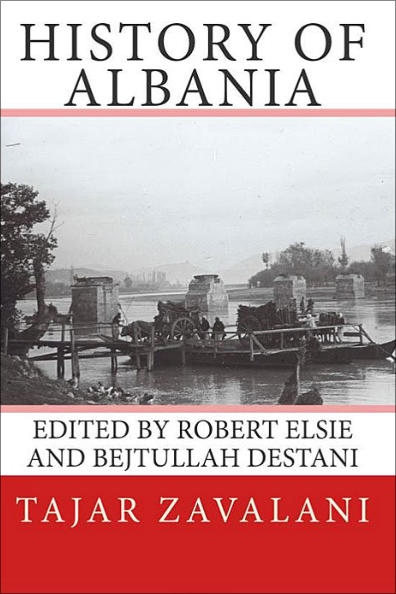
Tajar Zavalani
History of Albania
Edited by Robert Elsie and Bejtullah Destani
Albanian Studies, Vol. 1
ISBN 978-1507631300 Centre for Albanian Studies, London 2015 186 pp. The History of Albania by Tajar Zavalani (1903-1966) is the first full-length history of Albania to have been written in English. It covers the period from ancient times to the mid-twentieth century and provides the reader with a good overview of the historical development of a Balkan nation, which has to a large extent been ignored, even by scholars and specialists in Southeast European history. Retrieved after fifty years of oblivion, the fruits of Zavalani’s imposing project are now available to the reading public for the first time. Tajar Zavalani was born in Korça (Albania) and fled to Italy with the rise of the dictatorship of Ahmet Zogu. There, Soviet agents recruited him and offered to let him study in Russia as a “victim of counter-revolution.” In November 1930, after several years of study in Moscow and Leningrad, he left Russia, about which he now had serious misgivings. After the Italian invasion of Albania in 1939, Zavalani was interned in northern Italy, from where he escaped with his wife, Selma Zavalani (1915-1995), former lady-in-waiting to Queen Geraldine, via Switzerland to France and then in 1940, with King Zog’s party, on into exile in England. In November 1940, Zavalani was given a job in the BBC’s new Albanian-language service, which he came to head and where he worked until his death in an accident on 19 August 1966. He was a well- known and active figure of the Albanian exile community in Britain. The present History of Albania was composed for the most part between 1961 and 1963.Table of Contents
Introduction 1. The Illyrians The Illyrian ancestors of the Albanians — Historical and archaeological evidence — The settlements of the Illyrians in Albania and other parts of the Balkan Peninsula — The apogee of the Illyrian Kingdom — War with Rome — Illyrian culture. 2. Albania under the Romans Illyria as part of the Roman Empire — Administrative organisation — Economic prosperity — Durrës as the main port — The Via Egnatia as the link between Rome and the Byzantium — Apollonia as a centre of learning — Cultural progress. 3. The Middle Ages Administrative and military reforms under Justinian — The spread of Christianity — The Slav invasions of the seventh century A.D. — The new ethnic set-up in the Balkans — The Norman invasion under Robert Guiscard — The first reference to the Albanians instead of to the Illyrians. 4. The Albanian Principalities The spread of feudalism and the division of Albania into small principalities headed by local landowning families — The Despotat of Epirus — Albania and the Crusades — Albania as part of the Byzantine Empire (seventh to fifteen centuries A.D.). 5. The Ottoman Invasion The first stage of the Ottoman conquest in the fifteen century — The role of Venice — Sporadic resistance by Albanian feudal princes. 6. Scanderbeg George Castrioti, alias Scanderbeg, the Albanian national hero — Origin and captivity — Return to Albania — Resistance to Ottoman rule for a quarter of a century — Alliance with the King of Naples — Relations with the papacy — The siege of Kruja by Sultan Mehmet II — The death of Scanderbeg - Albania conquered by the Ottoman Empire. 7. The New Dark Ages The new Ottoman administration — Economic decline caused by the devastation of war — The Köprülü family — Conversion to Islam — Early Albanian literature — Christian resistance. 8. The Crisis of the Ottoman Empire The economic and political decline of the Ottoman Empire — Ali Pasha of Tepelena — His struggle for power and his European allies — Lord Byron — The death of Ali Pasha — The Bushati dynasty in Shkodra. 9. A Shaky New Order Albanian resistance to the Tanzimat reforms — The clan system of northern Albania and the Kanun. 10. National Revival Serbia and Montenegro at war with the sultan — The Congress of Berlin and the Albanian League of Prizren — The role of the Bektashi — Albanian settlements abroad — The struggle for autonomy and independence. 11. Freedom Reconquered Independent Albania and the First World War — The Paris Peace Conference — The Congress of Lushnja and the departure of Italian troops from Vlora — The struggle with Yugoslavia — The International Boundary Commission — Consolidation of a national administration and the rise of Ahmet Zogu. 12. The Rise and Fall of a Kingdom Experiment in democracy — The Revolution of June 1924 — The Albanian republic under Ahmet Zogu — Frontier settlements — Alliance with Italy — The monarchy — Slow economic and cultural advancement. 13. The Tragedy of Good Friday, 1939 The Italian invasion and the establishment of a fascist regime — Albania as an Italian province — Economic exploitation. 14. From Fascist to Communist Domination The Second World War — Anti-fascist resistance — The Balli Kombëtar — The Party of Legality — The communists — Civil war in Albania — The German occupation — The British Military Mission. 15. The People’s Republic The communist takeover under Enver Hoxha — Terror and the Peoples’ Courts — Radical economic and social change — The UNRRA Mission — Relations with the West — Relations with Yugoslavia — The Corfu Incident. 16. Soviet Satellite The Alliance with the Soviet Union — The construction of socialism — Industrialization — Resistance to collectivization — Economic and financial affairs — Life under the People’s Republic — Terror and repression — Soviet-Albanian relations. 17. At the Crossroads Enver Hoxha and Nikita Khrushchev — Deterioration of Soviet-Albanian relations — The break with the Soviet Union — Albania turns to China. Bibliography Buy this Book on AMAZON




| Robert Elsie | AL Art | AL History | AL Language | AL Literature | AL Photography | Contact |
